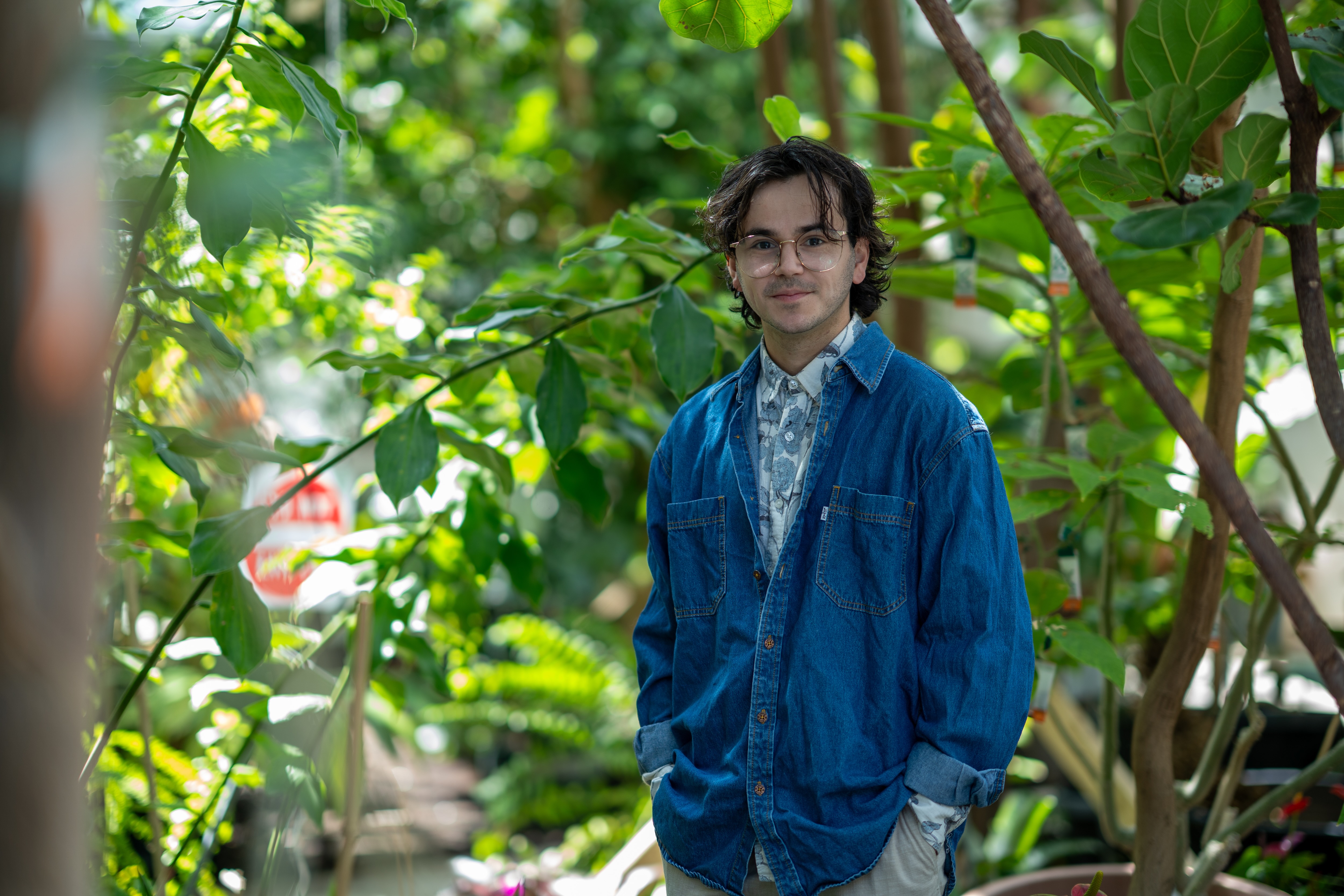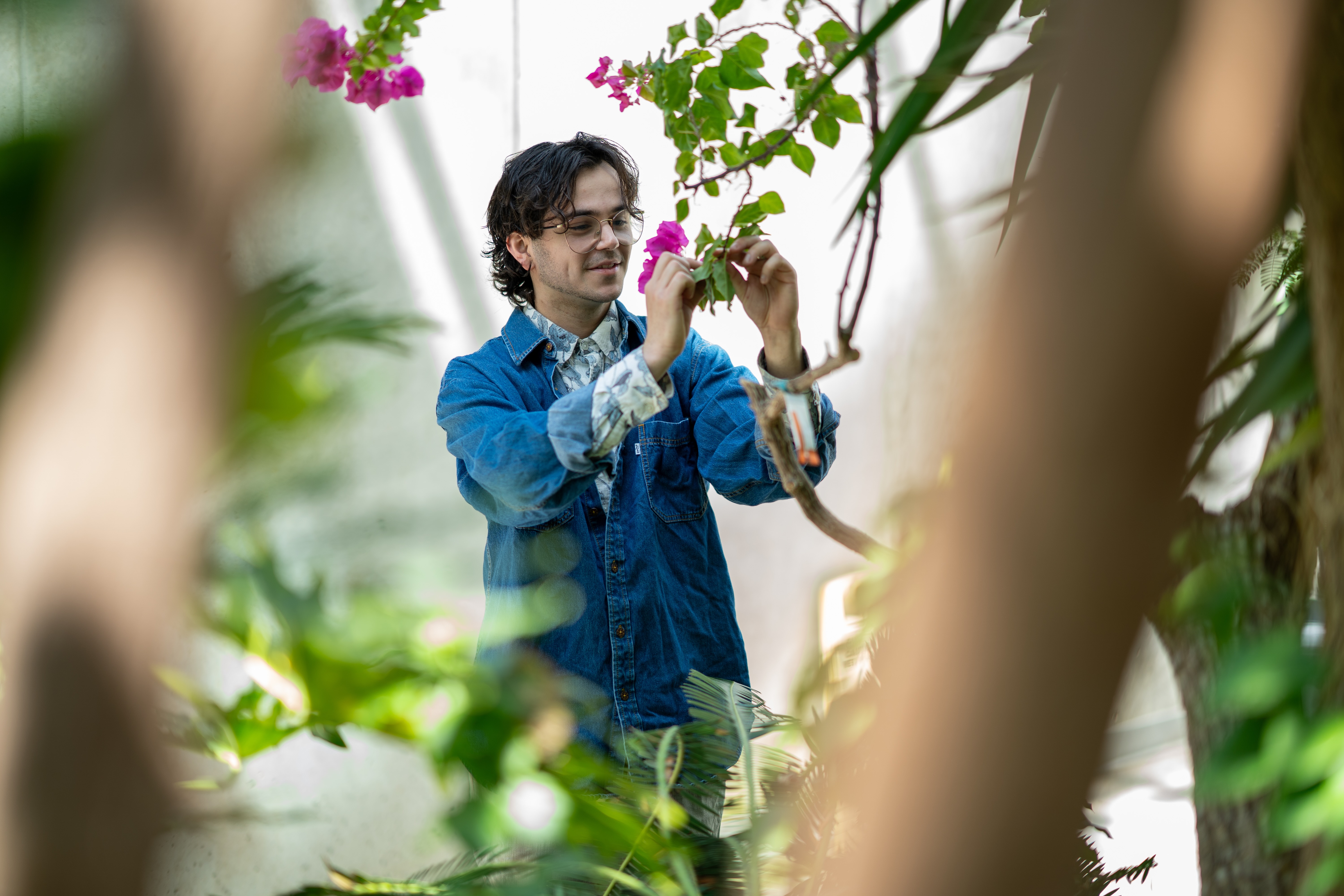Meet Shay Freger: endometriosis researcher and greenhouse volunteer

Shay Freger has been a volunteer at the McMaster Biology Greenhouse for ten years, after first wandering in for a plant sale during his undergrad. (Photos by Georgia Kirkos)
BY Caelan Beard
May 20, 2025
PhD student Shay Freger came to endometriosis research “by accident,” with a bus ride to Toronto that changed his life.
He completed his undergraduate degree at McMaster in Life Sciences in 2019. After that, he had an eclectic early career path: He spent a year in Massachusetts, completed a Master of Public Health in Edinburgh, and joined the military reserves, working as a Medical Assistant.
While he’d been at Mac, his undergraduate research from 2017-2019 focused on radiation biology. His co-supervisor at the time, toxicologist Lauren Foster, gave him a book one day that she thought he’d find interesting, on the ancient history of endometriosis.
“I knew nothing about it at first,” Freger said. Heading home to Toronto one weekend, he started reading the book on the GO bus.
“Somehow I could not put down this book,” he said. It captivated him so much that he missed his Union Station stop. When he looked up, 45 minutes past the city, he realized he was in Pickering – and that he needed to study this topic. He returned to Mac in 2022 to do his Master of Science on diagnostics and endometriosis, and is currently completing his PhD in Medical Sciences.
A puzzle with no picture
Endometriosis is one of those things where the more you learn, the more you realize how little is known, Freger said.
“In terms of what we know about women’s health in general was so far behind, and we’re only catching up now,” Freger said.
Endometriosis in particular is an enigmatic disease and extremely complex; Freger likens it to trying to solve a puzzle without any ideas what the final picture is supposed to look like. And the pieces keep changing. And you’re doing it in pitch black. Oh, and the room is on fire. “That’s kind of what it feels like almost every single day trying to work on endometriosis.”
There are three hallmark symptoms of endometriosis: painful periods, painful intercourse, and potential infertility.
But there are hundreds of symptoms beyond that patients may present with, including gastrointestinal, urinary, psychological, neurological, and musculoskeletal symptoms, with each person affected having their own unique journey and presentation.
“We say endometriosis is a gynecological disease… it is a full system disease,” Freger said. “The immune system’s dysregulated, you have bowel symptoms, you have neurological symptoms. You have psychosocial components, too, which might exacerbate or contribute to the diverse symptoms.”
Regardless of how patients present, “they get funneled through the exact same stepwise approach in terms of treatment, in terms of diagnosis, in terms of their medical care,” Freger said.
For his PhD, he’s studying diagnostic and management strategies for endometriosis, completing his work in gynecologic surgeon and sonologist Mathew Leonardi’s lab in the Faculty of Health Sciences.
Freger is focused on finding better, non-invasive ways to treat, diagnose, and characterize patients. His research involves phenotyping, where researchers consider a very large sample of people and try to find new “clusters” of similarities. These clusters could potentially inform better diagnoses and treatments.
Driving change
In addition to his research on endometriosis, Freger has served as a board member and education coordinator for the Endometriosis Network Canada, one of the leading policy analysts for EndoACT, and is working alongside national experts to develop Canada’s National Action Plan for endometriosis.
The policy is aimed at objectively improving clinical practice, research, and awareness and education across Canada. That includes translating primary literature for the public and defining a clear care pathway for endometriosis.
Trying to drive change – whether it’s how endometriosis is diagnosed, treatment, or a simple policy about what normal menstrual health should look like at a school level – is painful, Freger said.
“It feels like we’re all banging on doors, hoping for change and invoking change,” Freger said.
He wants more people to understand that painful periods are not normal – no matter what your family members, GP, or friends tell you.
“Missing exams, missing school, or being unable to work several days a month shouldn’t be considered normal,” Freger said. “These disruptions have profound impacts—not just on your physical and mental health, but on your finances, relationships, and overall quality of life. Endometriosis can permeate every facet of daily living.”
Once he completes his PhD, Freger plans to keep working on endometriosis.
“I could see myself being in this field forever,” he said, “Until something actually changes and something is done.”
In the greenhouse
It can be heavy work. For a much-needed escape, Freger turns to the McMaster Biology Greenhouse, where he’s been a volunteer for the past ten years.
He first wandered into the greenhouse for a plant sale during the second month of his undergrad. He got his plants, and then they all died within a month. “I was very upset by that, naturally,” Freger said.
So he went back to the greenhouse to ask what had gone wrong. Biology professor Susan Dudley suggested he stick around and volunteer.
He’s become a dedicated part of the greenhouse team since then. In his undergrad, he was there almost every day, leading tours, helping with the plants, or leading the Hamilton Youth Discovery program – which he started to give youth from difficult backgrounds experience in STEM.
Now, with a busier schedule, he describes himself as more of an “on-call” volunteer, usually there once or twice a week: “Whenever Susan needs me, I come running.”
Freger loves the sense of community that he’s found in the greenhouse, and the “sense of relief” that comes with being there.
“That weird smell you smell when it rains? That’s bacteria releasing. The greenhouse smells like that all the time,” Freger said.
It genuinely feels sometimes that he has to be there with the plants, he said. “It’s very cathartic.”
“We say plants are rudimentary… but they’re not,” he said. “Plants are equally complex as humans are. They communicate…. they react in such beautiful ways. They adapt to change.”

It also serves as a powerful reminder that complex systems can be lovely, too.
“Endometriosis is this disease of complexity,” Freger said. “Gardening and being at the greenhouse really just reminds me that complex systems can also be beautiful, especially if you tend to them.”
This year, Freger will mark 10 years of volunteering at the greenhouse. To celebrate, he’s hoping that one of his favourite plants, the titan arum, will bloom.
He may also lead a night tour, something he used to run more frequently. “People think that plants don’t really do anything at night, it’s the same as during the day.” But all of the plants are doing something different at night, Freger said: Some close their leaves to preserve water. Cacti bloom. “It’s a completely different story to tell when you’re in the greenhouse at night.”
Whether you’re in the greenhouse or the lab, Freger said, it’s a good reminder that “growth isn’t always visible” – at least not on the surface.
“Plants are slow, science is slow,” Freger said. “But that doesn’t mean change isn’t happening.”


